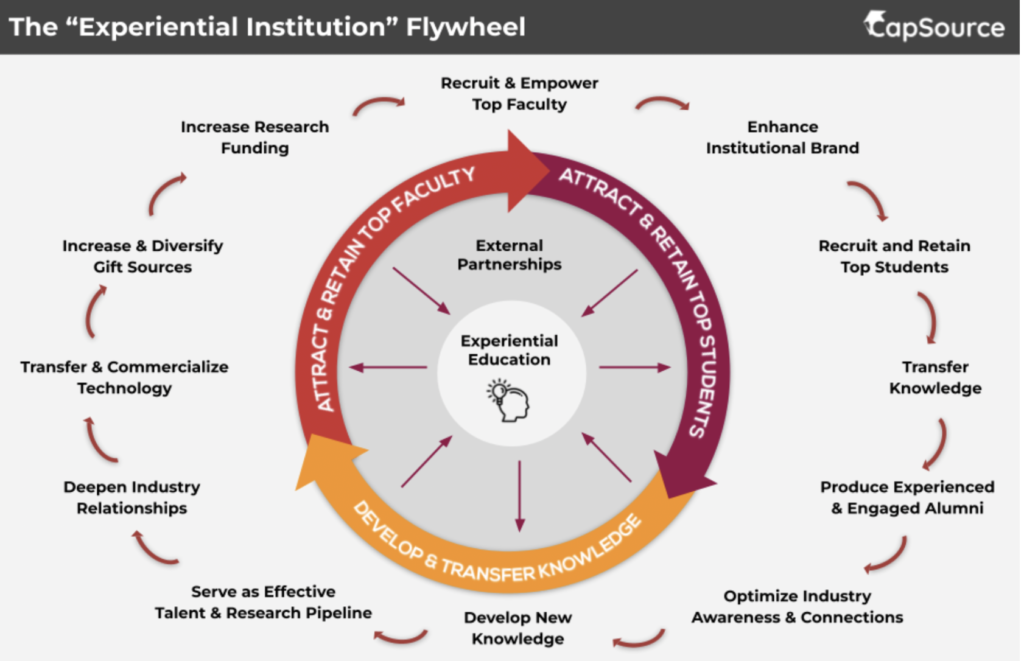
How Experiential Education Fuels the Higher Education Engine
When you think about institutions of higher education, chances are you don’t envision a robust ecosystem. Maybe that’s because every academic institution, at its core, has the same clear mission: attract and retain top faculty and students and develop and transfer new knowledge.

Of course, the 21st-century academic institution is made up of a much more complex series of stakeholders contributing different inputs while seeking diverse outputs.
Higher-ed institutions are multifaceted organizations with high budgets and high demands to deliver on high expectations. Key investments, objectives, and outcomes are deeply intertwined—when one succeeds it generates success for others, which can ultimately create a flywheel effect.
Like every engine, the individual parts and their interdependencies are each essential to overall success—but an engine can’t function without fuel!
In higher education, external relationships serve as high-velocity fuel. Industry relations stimulate greater sponsored research, identification of real-world research challenges, enhanced teaching, graduate career placement, alumni engagement, technology transfer, and private gifts—just to name a few! Each of these directly impacts the ability to attract and retain top faculty and students, and of course, the ability to generate and transfer new knowledge.
A high-velocity fuel—but sometimes a rare fuel
Productively engaging external enterprises can be challenging. Businesses are busy running their businesses. In order to be partners, external partners need to see clear value in any ongoing relationship, especially those with universities or higher education institutions, which present just as much risk as they do opportunity. Moreover, robust relationships are built over time!
The Power of Experiential Education
Just as external relations perform as a fuel for higher education ecosystems, Experiential Education is a fuel for external relations.
Whether you’re initiating or building external relationships, experiential education can play a foundational role! When engaged through experiential education, external partners get a first-person view of the power of the university. When successful, these relationships provide evidence of quality teaching, quality students, and the institution’s curiosity about and attention to the real-world challenges that businesses and industries face.
Being exposed to well trained and educated students, companies and outside organizations are more likely to recruit and hire from the institution, which in turn places alumni in companies with which the institute has a relationship. Those same organizations are then more likely to then become involved in and grow research goals, engage in development of robust collaborations, and accelerate broader institutional goals.

The Challenge (and Solution) of Experiential Education
As noted in our article of Higher Education’s Love-Hate Relationship with Experiential Learning (Published 11/16/22), almost every higher education institution identifies experiential education’s teaching value—but it can be challenging to build and manage high performing programs.
Despite the challenge of organizing and scaling experiential learning programs, institutions must recognize the importance of experiential education and external relationships as the fuel for growth and long-term success. Once they do, it’s easy to make the case for why highly effective tools are needed to:
- Streamline complex processes that involve multiple people and functions,
- Provide transparencyand accountability between people and functions,
- Measure and track the outcomes that matter to each stakeholder,
As the flywheel suggests, once an institution makes the necessary investment into experiential education and external relationships, they are able to mature and grow in ways that are complementary to its core mission. Beyond that, each of the flywheel accelerants should be measurable and trackable in many ways, which helps leading administrators further emphasize the importance for continual investment into, improvement of, and growth of experiential education and external relationships.
The Case for CapSource
CapSource aims to be the most robust, centralized, customizable industry-integrated experiential learning management system on the market!
CapSource is the right tool to build, deliver, and grow experiential learning programs in the short term, and presents many long-term added values given the long-term nature of the relationships and outcomes generated as a result of highly effective, trackable collaborations.
CapSource is designed to help faculty and administrators streamline, track, and scale experiential education. We have engaged with and served faculty and students at over 150 global academic institutions that are on the cutting edge of designing and delivering on their experiential education promise.
CapSource is a highly intuitive software platform designed for the experiential learning environment—which is complemented with strong partnership support. Whether you’re planning Synchronous Industry Projects (like Capstones, Live Cases, or Internships), Asynchronous Projects (like OpenCases), or Mentorship Experiences, CapSource optimizes the activities required to organize students, learning goals, and industry partners so that outcomes are measurable, trackable, and reportable on a faculty, program, college, and institution level!
Is it time for more effective, more scalable experiential learning?
Register and Get Started Today!
Please join the conversation: We would love your input! What are your experiences, challenges, and goals? Join us over the next few weeks in this blog as we explore these points and share experiences and perspectives from participants or register today and begin exploring CapSource’s free version to get started.

